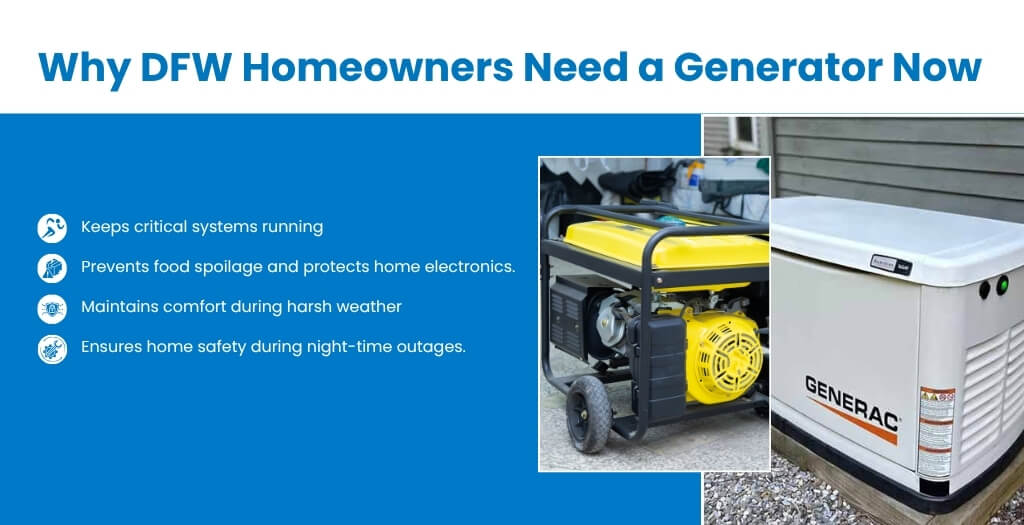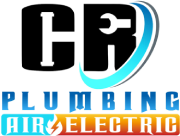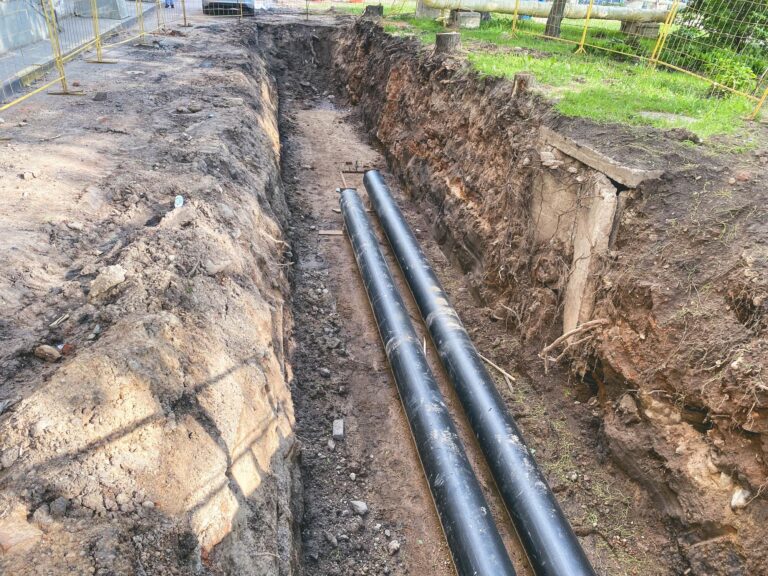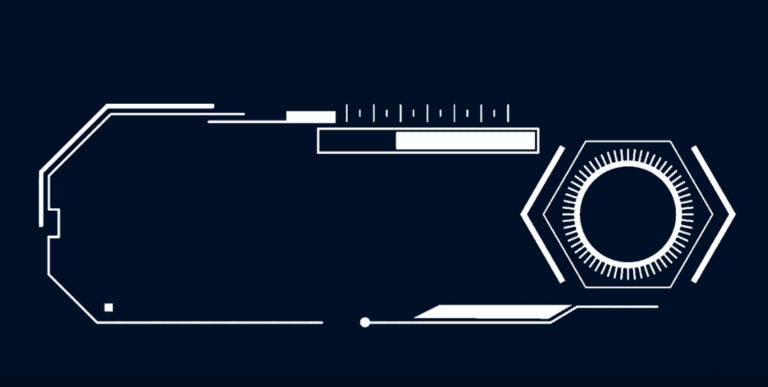Guide to Generator Installation in DFW: Whole-Home vs Portable – Which Fits Your Home Best?
Power cuts in Dallas-Fort Worth aren’t just inconvenient, they can disrupt comfort, safety, and even your daily routine. But what if your lights, Wi-Fi, and appliances never turned off, even during a blackout?
According to the U.S. Energy Information Administration, the average U.S. home experiences at least one power outage every month, with higher frequencies in storm-prone states like Texas.
In this guide, you’ll learn the difference between whole-home and portable generators, which generator type best suits your home size, usage, and budget, the installation, maintenance, and cost breakdown for each, and how to choose a certified installer in DFW.
1. Why DFW Homeowners Need a Generator Now

Frequent storms, aging infrastructure, and unpredictable blackouts have made generators more of a necessity than a luxury. Here’s why a generator installation in DFW matters:
- Keeps critical systems running: HVAC, medical devices, refrigerators.
- Prevents food spoilage and protects home electronics.
- Maintains comfort during harsh weather—summer heat or winter freeze.
- Ensures home safety during night-time outages.
When power fails, the question isn’t if you need a generator—it’s which one you should choose.
2. Whole-Home Generator Installation: Permanent, Automatic, Reliable

A whole-home (standby) generator is permanently installed outside your home, usually connected to your natural gas or propane line. It automatically powers your house within seconds of an outage.
Pros:
- Automatic operation: Activates instantly during outages.
- Full power backup: Runs everything, HVAC, lights, water heaters.
- Fuel efficient: Uses gas or propane; no manual refueling.
- Boosts property value: A long-term home investment.
- Low noise and safe: Professionally installed and integrated.
Cons:
- Higher upfront investment.
- Requires professional installation and permits.
- Needs annual service and inspection.
Best For:
Homeowners who want complete peace of mind and uninterrupted power for their entire property.
3. Portable Generator: Affordable Flexibility for Short
Term Outages
A portable generator is compact, movable, and powers only essential appliances. It’s great for temporary outages or small homes.
Pros:
- Lower upfront cost.
- Portable and flexible use across locations.
- Easy plug-and-play setup.
- Great for occasional outages.
Cons:
- Manual startup and connection.
- Limited power capacity.
- Needs regular refueling.
- Produces more noise and fumes.
Best For:
Rural or suburban homeowners who need an affordable short-term power solution for key devices like refrigerators, lights, or Wi-Fi routers.

4. Cost Comparison: Whole-Home vs Portable Generator Installation in DFW
| Type | Generator Cost | Installation Cost | Fuel Type | Power Capacity | Annual Maintenance |
| Whole-Home (Standby) | $3,000–$10,000 | $3,000–$7,000 | Natural Gas / Propane | 22–48 kW | $200–$400 |
| Portable | $500–$2,500 | $300–$800 (Transfer Switch) | Gasoline / Diesel | 2–10 kW | $100–$150 |
Costs in DFW vary based on your home’s wiring, gas line distance, and generator brand. Always consult a licensed DFW electrical service provider for accurate estimates.
5. Professional Generator Installation Process: What to Expect
When you hire certified electrical experts in DFW, here’s how your installation typically goes:
- Site Assessment: Power needs and location evaluation.
- Permit & Prep: Local compliance and permit approvals.
- Generator Placement: Secure setup near gas line on a stable pad.
- Electrical Connection: Through an automatic transfer switch.
- Testing & Inspection: Ensures safe, code-compliant performance.
For portable generators, the process involves connecting a manual transfer switch for safe indoor use.
6. Safety & Warranty: Why Expert Installation is Non-Negotiable
DIY installations might look cheaper, until they cause electrical fires or void warranties. Professional installers ensure safe load balancing and grounding, correct fuel and exhaust handling, full warranty coverage on equipment, and compliance with DFW building codes.
Service Interval & Warranty Tip:
Most leading generator brands recommend annual servicing and offer warranties ranging from 5 to 10 years when installed by a licensed professional.

7. Real-World Lesson: The 2021 DFW Winter Power Crisis
During the Texas Winter Storm 2021, thousands of homes went dark for days. Homes with whole-home generators stayed warm and powered. Homes relying on portable units faced challenges, refueling, noise, and outdoor setup. The takeaway: preparation always wins.
8. How to Choose the Right Generator for Your Home
| Factor | Whole-Home Generator | Portable Generator |
| Budget | Higher upfront, long-term ROI | Affordable, short-term |
| Power Coverage | Entire home | Essentials only |
| Operation | Automatic | Manual |
| Fuel Source | Natural Gas / Propane | Gasoline / Diesel |
| Outage Frequency | Frequent / Extended | Occasional |
| Installation | Professional required | Basic setup |
If you live in DFW or nearby suburbs, a whole-home generator ensures complete readiness for unpredictable power outages year-round.

9. FAQs: Generator Installation in DFW
Q1. How long does installation take?
Usually 1–3 days, including site assessment, permits, and testing.
Q2. How much does a standby generator install cost?
Between $6,000–$15,000 in DFW, depending on home size and power load.
Q3. Can portable generators power an entire home?
No, they’re designed for essential appliances only.
Q4. Do I need permits for installation?
Yes. Both portable and standby generators with transfer switches need DFW city permits and professional inspections.
Q5. How often should I service my generator?
Once per year or every 100 hours of use for efficiency and safety.
Q6. What generator size fits an average DFW home?
Most homes need 22–24 kW for complete backup. Ask your installer for a load test.








